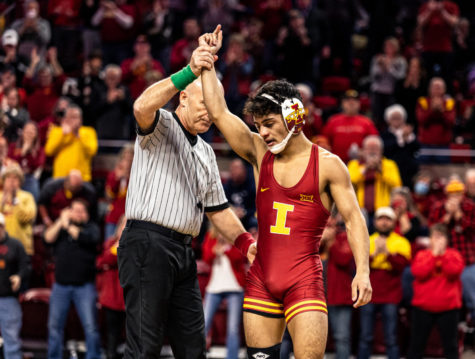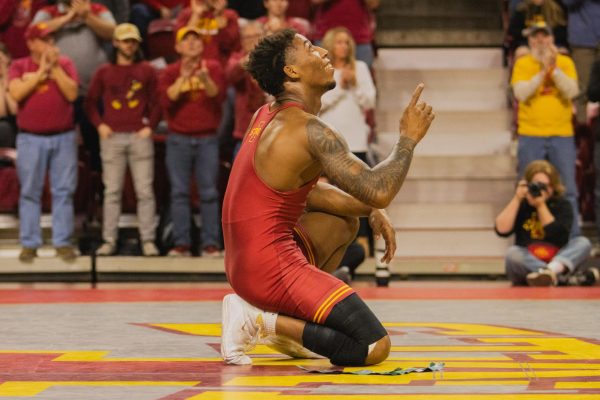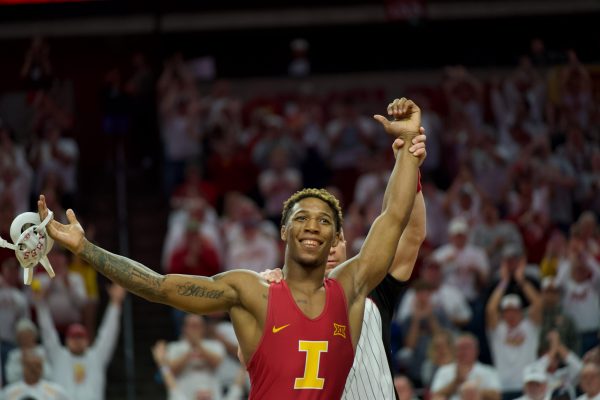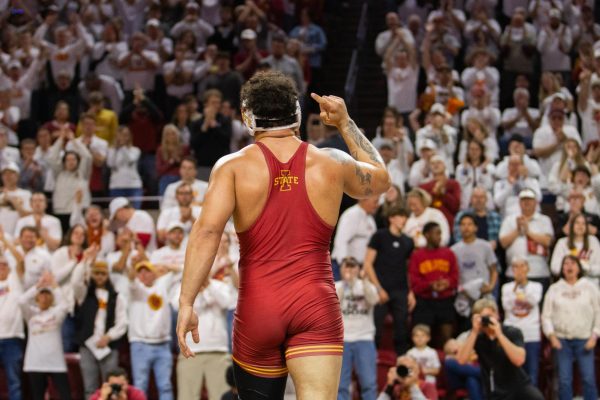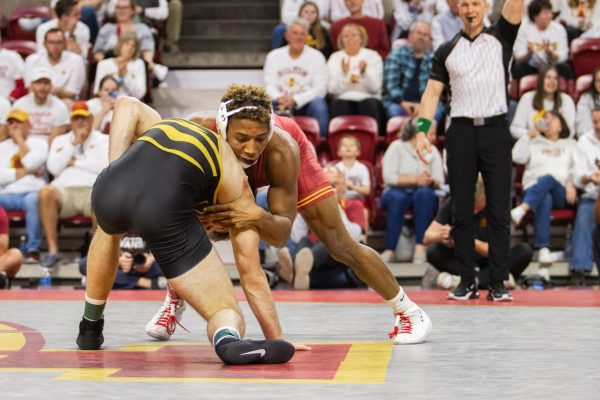WRESTLING: There and back again
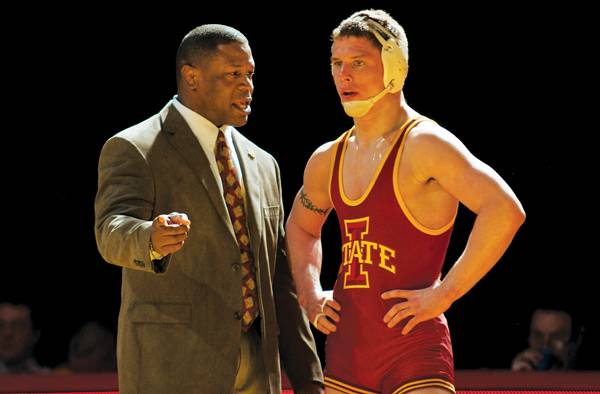
ISU coach Kevin Jackson talks with junior Jon Reader on Sunday during the match against Missouri. Jackson competed in mixed martial arts, including a brief stint in the UFC, after competing as a collegiate and Olympic wrestler. Photo: Logan Gaedke/Iowa State Daily
February 16, 2010
By Shane Lucas
Daily Staff Writer
ISU wrestling coach Kevin Jackson has a resume that speaks for itself.
Olympic gold medalist, two-time World champion, captain of Iowa State’s 1987 national championship team and a member of the U.S. National Wrestling Hall of Fame rank among his top accomplishments.
Coming off a successful college and Olympic wrestling career, Jackson was introduced to MMA by fellow Olympic gold medalist and Oklahoma State wrestling standout Kenny Monday after he participated in an event.
The clear ties to the sport they excelled in drew their interest to the growing sport.
“Obviously we realized that wrestling played a big role in style of fighting,” Jackson said. “Watching the fights we noticed that the better wrestlers would win most of the time.”
After he didn’t make the 1996 Olympics wrestling roster, Jackson was looking for a way to stay in shape and maintain his finances.
“You need to make up that money somehow, some way, and fortunately MMA came along, offered us a chance to fight and we had a good agent,” he said.
Before he even had his first fight, Jackson was confident that his wrestling background put him at an advantage over the other MMA fighters.
“The reason I really fought is that I knew I wouldn’t get hurt,” Jackson said. “The bottom line is the only way I could lose is if I was stupid enough to stand on my feet and box with a guy who’s a better boxer or kickboxer.”
Jackson’s most memorable fight was his first one, which took place at an event called Extreme Fighting 4, and saw John “The Machine” Lober as his opponent.
Lober had made a name for himself in the MMA world by defeating UFC mainstay Frank Shamrock, who would pop up later in Jackson’s career.
“Job Lober was probably my most exciting fight,” Jackson said.
“If I was actually putting stuff up on YouTube, that’s the fight I’d put up. I know a lot of other stuff comes up on YouTube that isn’t as favorable for me, but that was probably my best fight.
Jackson was able to force Lober into submission at the 1:12 mark in the second round. On top of Jackson and Lober, the Extreme Fighting 4 card featured future UFC heavyweight champion Maurice Smith.
Jackson credits the event as the one that brought him in into the MMA spotlight, as his next stop was the big leagues — UFC 14.
At UFC 14, Jackson dominated the night’s middleweight (now light heavyweight) tournament and defeated opponents Todd Butler in 1:27 by technical submission and Tony Fryklund by choke submission in 44 seconds.
Along with winning the tournament, Jackson grabbed the No. 1 ranking in the middleweight class.
All of that after just three career fights?
“It was surprising based on my short time in the sport,” Jackson said. “I think they looked at my potential and the things I was actually doing because there were guys out there like [Frank] Shamrock that had quite a few fights.”
Before long, Jackson had a made a name for himself in the MMA realm.
Enthusiastic fans began to recognize him as an up-and-coming star, but Jackson was just having fun and enjoying the ride.
“The fighting was the easiest money I ever made, it was just fun,” Jackson said. “People put so much emphasis on the fighting game so you were a celebrity. They were taking pictures of you, shaking your hand and it was just excitement that surrounded the overall sport.”
At that time, the UFC gave out medals to its competitors. After Jackson received a gold medal for his UFC 14 win, people began to ask where it stood with his Olympic gold medal he won in Barcelona in 1992.
“I would tell them that there’s really no comparison,” Jackson said.
“Obviously it’s exciting and it’s fun, but I had to train my whole life to get a gold medal and I had to wrestle five of the toughest guys in the world. In the UFC, I had to beat two guys in one night and I only part-time trained for six months.”
Perhaps the biggest fight of Jackson’s career came on Dec. 21, 1997 at UFC Japan when he took on Frank Shamrock for the first-ever UFC Middleweight title.
“That’s probably the quickest I’ve ever ended any competition whether it’s wrestling or fighting or whatever,” Jackson said.
Jackson got an early jump on Shamrock and took him to the ground. Before he could make another move however, Shamrock caught Jackson’s right arm and forced him into an armbar submission hold.
The biggest fight of Jackson’s career ended in 12 seconds.
“That’s when I really realized that I never gave these guys the respect they deserved,” Jackson said.
“They do have some great skills that you have to be aware of and you have to be trained in and during my career I never got with the experts that I needed to get with to feel the positions these guys could create.”
Although he ended his brief career with a win over Sam Adkins at Extreme Challenge 18, and finished with a 4–2 career record, the Shamrock fight is the one he is largely remembered by.
Some members of the ISU wrestling team occasionally bring the fight up to give their coach a hard time, and usually regret doing so.
“It’s joked about every now and then,” Jackson said with a smile.
“I just have to jump on some of those guys and make them submit in practice to show them that I did have some skills.”
During his time in MMA, Jackson worked with Phoenix-area trainer Tim McClellan.
McClellan is now a strength and condition specialist for Rehab Plus, a company that has trained professional athletes like Donovan McNabb, Dwight Freeney and Jerryd Bayless.
Although he wasn’t around for very long, Jackson formed friendships with many of the fighters on the circuit.
He still calls many names from UFC past and present as friends. Maurice Smith, Renzo Gracie, Bas Rutten and UFC Hall of Famer Randy Couture are just a few that Jackson still stays in contact with.
“The MMA world is almost as close as the wrestling world,” Jackson said.
“Obviously you form relationships if you do something along those lines and those relationships still remain.”
The sport, especially the UFC, become increasingly popular in the past few years but still has many of its “street fight” connotations that it had dealt with since its beginning. Jackson said he is still watches MMA events and believes people should focus on the skilled fighters instead of the ever-growing amateur fights.
“I’m definitely a fan and supporter of the MMA game,” Jackson said.
“There’s a difference between some of the shows where you see technical fights and the amateur nights where it’s two guys out there that look like they just got done drinking at a bar.”
In 1998, Jackson retired from MMA and his career in wrestling.
While he was actually considering staying in MMA to fight a few times a year, a job offer from USA Wrestling lured him back to the sport he loves.






